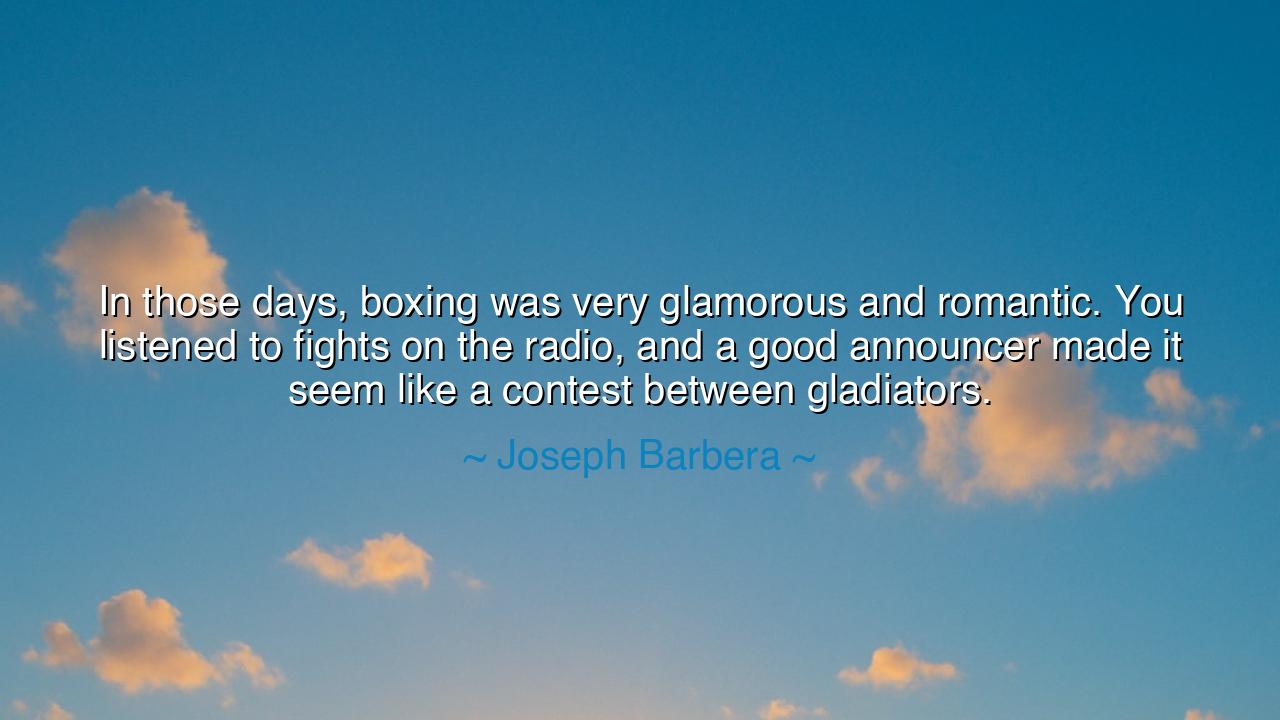
In those days, boxing was very glamorous and romantic. You
In those days, boxing was very glamorous and romantic. You listened to fights on the radio, and a good announcer made it seem like a contest between gladiators.






“In those days, boxing was very glamorous and romantic. You listened to fights on the radio, and a good announcer made it seem like a contest between gladiators.” Thus spoke Joseph Barbera, creator of stories for the young, yet here reflecting on the theater of men in combat. His words summon us back to a time when the imagination was the arena, when voices over the air painted warriors not of the Colosseum, but of the squared ring. It was a spectacle both brutal and noble, a dance of fists elevated into myth by the power of storytelling.
For in truth, the sport of boxing has always carried the double nature Barbera describes. On one hand it is violent, the clash of bodies enduring pain. On the other, it is exalted, a metaphor of courage, resilience, and the spirit that refuses defeat. When filtered through the radio’s unseen theater, when a gifted announcer made each punch echo like thunder, the fighters became larger than life. They were no longer men of sweat and blood—they were gladiators, heirs of Rome’s ancient contests, battling not only for victory but for glory.
Consider Joe Louis, the “Brown Bomber,” who in 1938 fought Max Schmeling in a bout that became more than sport—it became a symbol of freedom against tyranny. Millions who listened by radio did not hear merely the sound of fists striking; they heard nations colliding, ideals clashing, hope rising from despair. Louis, in that moment, was not only a man; he was a hero, his triumph carrying the spirit of his people. In such moments, the romance of boxing was undeniable, for it revealed the soul of struggle elevated into legend.
Barbera’s words also speak to the power of narrative itself. Without the announcer’s voice, without the glamorous framing, boxing might appear only as violence. But with words to guide the ear, the listeners saw with the mind’s eye something grander: warriors locked in epic trial, embodying timeless virtues of endurance, courage, and strength. This is the gift of the storyteller—to take the ordinary and clothe it in majesty, to remind us that even in the arena of flesh and bone there dwells the echo of myth.
And so, we learn that every struggle we endure in life may also be told in two ways: as mere hardship, or as epic battle. If we see only the pain, then we miss the meaning. But if we frame our trials as contests worthy of gladiators, then we, like the fighters of old, rise above suffering and grasp nobility in the very act of enduring. The romantic vision does not deny the cost—it transforms it into honor.
History teaches us that this is true not only in sport, but in all walks of life. The builders of cathedrals, the explorers who crossed oceans, the mothers and fathers who bore sacrifice for their children—all were, in their way, gladiators. Their contests were not fought with fists, but with patience, endurance, and the will to keep striving. To remember them as such is to see the glamour and romance in perseverance itself.
Therefore, the lesson is clear: let your struggles be told as stories of courage. Do not diminish them as mere burdens. Let your inner announcer describe your hardships as noble contests, for in this way, you will lift your spirit and inspire others. Whether your arena is the workplace, the home, or the journey of the soul, see yourself as a fighter who endures, who rises, who strives to the end.
So take this teaching to heart: life itself is a ring, and each of us a contender. Some days we win, some days we fall, but in the telling of our story, we may all become gladiators. And when the world listens to the announcer of our deeds, let it be said that we fought bravely, that we endured nobly, and that in the struggle itself we found not only pain, but also romance.






AAdministratorAdministrator
Welcome, honored guests. Please leave a comment, we will respond soon